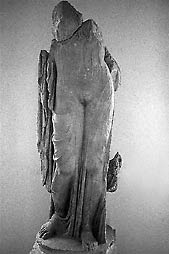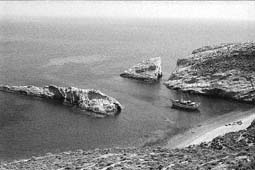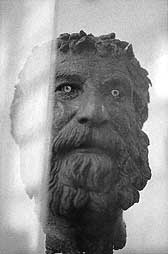Of Herodotus of Halicarnassus’ inquiry here’s the showing forth that neither the deeds of human beings with time pass away nor great and marvellous actions, some shown forth by Greeks, some by barbarians, lose renown, in respect to all else and the cause why they warred with each other.
Now, the Persian spokesmen assert the Phoenicians proved the cause of the quarrel. For they say that those men, on coming from the so-called Red Sea to this sea and settling in that place in which even now they are settled, at once applied themselves to long voyages, and exporting wares of Egypt and Assyria, came to the rest of the land and particularly to Argos (Argos during that time surpassed in all ways those in the country now called Greece), that on coming to this very Argos, the Phoenicians were disposing of their cargo until, the fifth or sixth day after they had come, almost everything having been sold off by them, there went to the sea many other women and especially the king’s daughter, and her name was (in perfect accord with what the Greeks too say) Io the child of Inachus, and that they stood at the ship’s stern and were bargaining for the wares for which their desire was greatest, when the Phoenicians, cheering on one another, rushed at them, and indeed the greater number of the women escaped, but Io with others was seized, and the men put them onto the ship and went sailing off toward Egypt.
That thus Io came to Egypt the Persians say, in disagreement with the Greeks, and that that was the first beginning of the injustices, but after it some of the Greeks (for they are unable to relate their name), they assert, put in at Tyre in Phoenicia and seized the king’s daughter, Europe (these might have been Cretans), and, although that indeed was done by them tit for tat, yet after it the Greeks proved the cause of the second injustice. For they say that they, on sailing out with a large ship to Aia in Colchis and over the river Phasis, accomplished everything else for which they had come and thereupon seized the king’s daughter, Medea, and, when the Colchian had sent a herald to Greece and demanded justice for the seizure and demanded back his daughter, they then replied that those men in Io of Argos’ case paid them no penalty for the seizure and therefore they themselves would pay his men none.
The next generation after that, they say, Alexander, the son of Priam, having heard of it, resolved a woman from Greece should become his through seizure, because he knew at all events that he would pay no penalty, since they refused to pay, and just then, at his seizure of Helen, the Greeks decided at first to send messengers and to demand back Helen and demand justice for the seizure, but their opponents, when they put forward these demands, brought forward to them Medea’s seizure and objected that, although they for their part gave no satisfaction nor gave her up at men’s demanding her back, they wanted justice to be done to themselves by others.
So then thus far the Persians say there were seizures alone at each other’s hands, but from then on it was the Greeks who proved greatly guilty, because they began to advance with an army against Asia before they themselves against Europe and they maintain that, although seizing women is the work of unjust men, yet, once they are seized, taking pains to exact vengeance is that of unintelligent, while having no care at their seizure is that of prudent, since it’s quite clear that, if women themselves were not willing, they would not be seized. Accordingly they, the men from Asia, the Persians say, when the women were being seized, considered it of no account, but the Greeks for a woman of Lacedaemon assembled a large armament and then came to Asia and put down the power of Priam. Hence on each and every occasion they believe the Greek to be hostile to them. For Asia and the barbarian nations that live in it the Persians claim as their own, but Europe and the land of Greece they hold to be separate.
The above the Persians say happened and on account of the capture of Ilium they find there existed for themselves the beginning of enmity to the Greeks, but concerning Io the Phoenicians speak in a manner unlike the Persians; for they say they did not seize and bring her to Egypt, but that in Argos she had intercourse with the owner of the ship and, when she had learned she was pregnant and was ashamed before her parents, just then voluntarily on her own she sailed out with the Phoenicians that she might not be discovered. Now, these accounts the Persians and the Phoenicians give. I, however, about them am not going to say that either or some other account is what happened, but rather after indicating that man who I myself know initiated unjust actions against the Greeks, I will proceed to the later part of my account by going through small and great towns of human beings alike. For many of them that in the past were great have become small and those that in my time were great previously were small. Therefore, since I know human happiness remains not at all in the same place, I will mention both alike.


